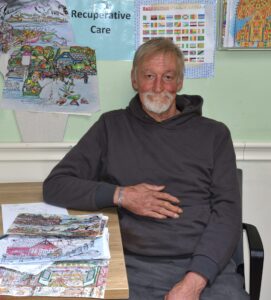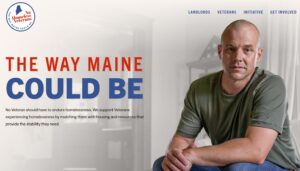October 2024 marks two years of service to vulnerable community members experiencing unsheltered homelessness at the Elena’s Way Wellness Shelter. Since opening its doors, Elena’s Way has provided over 18,000 bed nights to individuals experiencing homelessness.
That represents more than 18,000 times that a person has been able to sleep inside a warm, safe, and dignified shelter environment instead of in an encampment or outside in the elements.
In the past two years, Elena’s Way has successfully helped 24 shelter guests transition to housing placements, which is a rate of 1.5 placements a month. “Given the population we are serving, and the housing crisis in and around Portland, that is a remarkable achievement,” says Henry Myer, Director of Elena’s Way. “It’s working. Our clients, many of whom have slept outside for years, are entering Elena’s Way, getting the help they need, and slowly but surely, they are moving into housing.”
Opened in October 2022, Elena’s Way is one of Maine’s five privately operated low-barrier shelters and is an ongoing and integral part of the solution to homelessness in Portland, providing warmth, safety, and intensive services to up to 40 people, of all genders, who are experiencing homelessness and have complex physical and behavioral health needs.
Elena’s Way specifically serves people who have experienced chronic unsheltered homelessness and cannot access other shelters. There are many barriers that can prevent people from successfully accessing and maintaining shelter and receiving services. Complex behavioral and mental health issues or a substance use disorder can stop people from accessing shelter, but even something like separation from a pet or loved one can also be a barrier for many people. Elena’s Way addresses these different barriers, with intensive services, informed by social work best practices.
Brianna Epping has worked for two years at Elena’s Way as a caseworker. She says that to address barriers to shelter and create an inclusive and welcoming shelter environment, “we build relationships with people and create a foundation of trust and care. We work to meet people’s basic needs and then work on things that interest them, make them happy, and will help create long-term stability.” There are also various groups and programming that help to build community with staff and among residents. There’s a weekly Tea Time, a women’s group, a writing group, narcotics anonymous (NA) meetings, and more.
We build relationships with people and create a foundation of trust and care.
Brianna Epping, Caseworker, Elena's Way Wellness Shelter
Myer adds, “we work hard to reduce the indignities of homelessness.” Many times, someone experiencing homelessness has little control over their schedule: they have to line up for every meal, line up again for a shelter cot each evening, and leave the shelter by a certain time each morning, carrying everything they own on their backs. At Elena’s Way, guests have control of their own time and space. As one example, Henry says, “we’ve empowered clients to take food when they want it or when they need it.” Guests at Elena’s Way can eat and sleep when they want. They have a stable, safe place to stay, with space to store their belongings.
We work hard to reduce the indignities of homelessness.
Henry Myer, Director of Elena's Way Wellness Shelter
Over the past two years, Elena’s Way professional staff has also established partnerships with local agencies and community partners to improve service to shelter guests, boost quality of life, and help people successfully transition to housing. Many clients cannot access quality medical care due to barriers like transportation, cost, and prior negative experiences. In the spirit of “meeting people where they’re at,” Preble Street partners with Greater Portland Health, a community-based medical provider, to host a weekly clinic on-site at Elena’s Way to offer clients primary care.
As we work to end homelessness in Maine, we need to continue to invest in more low-barrier shelters like Elena’s Way. Two years in, Elena’s Way is a model for how we can take care of the most vulnerable people in our community.
Continue Reading...

Brian’s Story
Sitting at a table at the Recuperative Care Program (RCP), Brian lays out pages of his art. “I’m working on making a children’s coloring book,” he says. Most of the pieces he has laid out are of captivating coastal scenes featuring birds, boats, and buoys. The longer you look at each page, the more you’ll

Anti-Trafficking Services at risk without federal funds
Pictured: Most of the Preble Street ATS team, in front of a portrait of dee Clarke, a trafficking survivor who became an inspirational advocate As of October 1, Preble Street Anti-Trafficking Services (ATS) and many other anti-trafficking program providers across the country will be left without a large part of their funding. Since launching in

No Homeless Veterans
Preble Street Veterans Housing Services (VHS), in partnership with other Veterans services agencies* across the state have come together to dramatically reduce Veteran homelessness in Maine. Earlier this month, VHS and partners launched a housing surge to get as many homeless Veterans as possible into housing in the 100 days leading up to Veterans’ Day.
